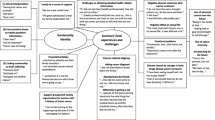Abstract
Purpose
Globally, there are nearly 33 million persons who have survived 5 or more years after a diagnosis of cancer [1]. We explore the salience of cancer in such people’s self-concept as an important element for creating patient-centered care for those living with a cancer history.
Methods
Our data are responses to a free-listing exercise and subsequent qualitative interviews with 53 individuals aged between 45 and 74 who were diagnosed with non-Hodgkin’s lymphoma or breast or prostate cancer at least 3 years prior and had completed acute treatment. Participants lived in the Baltimore-Washington region of the USA.
Results
Cancer was not necessarily salient to participants’ current self-concept, and espousal of a “survivor” identity is complex. We construct a typology of seven contrasting meanings of “survivor” based upon participants’ narratives (factual, beaten, functional, temporary, adversity, passage of time, and lucky or blessed) and present interviewees’ rationales as to why they did or did not adopt a survivorship identity.
Conclusions
We examine the complexity of “survivorship” as an identity and people’s affiliation with it, as well as how this relates to other salient and fluid elements of people’s sense of self within a life course perspective.
Implications for cancer survivors
Understanding how cancer factors into people’s self-concept throughout the life course is important for designing effective, patient-centered programs that acknowledge diverse experiences and expectations and possible changes with the passage of time.
Similar content being viewed by others
References
Centers for Disease Control and Prevention, Division of Cancer Prevention and Control (2015) Global cancer statistics. In: International Cancer Control. 2015. http://www.cdc.gov/cancer/international/statistics.htm. Retrieved March 3, 2015.
Phillips JM, Cohen MZ, Moses G. Breast cancer screening and African American women: fear, fatalism, and silence. Oncol Nurs Forum. 1999;26:561–71.
Clarke JN, Everest MM. Cancer in the mass print media: fear, uncertainty and the medical model. Soc Sci Med. 2006;62:2591–600.
Miles A, Voorwinden S, Chapman S, Wardle J. Psychologic predictors of cancer information avoidance among older adults: the role of cancer fear and fatalism. Cancer Epidem Biomar. 2008;17:1872–9.
Muzzin LJ, Anderson NJ, Figueredo AT, Gudelis SO. The experience of cancer. Soc Sci Med. 1994;38:1201–8.
Else-Quest NM, LoConte NK, Schiller JH, Shibley HJ. Perceived stigma, self-blame, and adjustment among lung, breast and prostate cancer patients. Psychol Health. 2009;24(8):949–64.
Bellizzi K, Blank T. Cancer-related identity and positive affect in survivors of prostate cancer. J Cancer Surviv. 2007;1:44–8.
Zebrack B. Cancer survivor identity and quality of life. Cancer Pract. 2000;8:238–42.
Park CL, Zlateva I, Blank TO. Self-Identity after cancer: “survivor”, “victim”, “patient”, and “person with cancer”. J Gen Intern Med. 2009;24(Suppl2):S430–5.
Deimling GT, Bowman KF, Wagner LJ. Cancer survivorship and identity among long-term survivors. Cancer Invest. 2007;25:758–65.
Mullan F. Seasons of survival: reflections of a physician with cancer. N Engl J Med. 1985;313(40):270–3.
Kaiser K. The meaning of the survivor identity for women with breast cancer. Soc Sci Med. 2008;67:79–87.
Chambers SK, Baade P, Meng X, Youl P, Aitken J, Dunn J. Survivor identity after colorectal cancer: antecedents, prevalence and outcomes. Psychooncology. 2011;21:962–9.
Khan NF, Harrison S, Rose PW, Ward A, Evans J. Interpretation and acceptance of the term ‘cancer survivor’: a United Kingdom-based qualitative study. Eur J Cancer Care. 2012;21:177–86.
Kelly KM, Shah N, Shedlosky-Shoemaker R, Porter K, Agnese D. Living post treatment: definitions of those with history and no history of cancer. J Cancer Surviv. 2011;5:158–66.
Jagielski CH, Hawley ST, Corbin K, Weiss MC, Griggs JJ. Phoenix rising: who considers herself a “survivor” after a diagnosis of breast cancer? J Cancer Surviv. 2012;6:541–457.
Morris BA, Lepor SJ, Wilson B, Lieberman MA, Dunn J, Chambers SK. Adopting a survivor identity after cancer in a peer support context. J Cancer Surviv. 2014;8:427–36.
Bell K, Ristovski-Slijepcevic S. Cancer survivorship: why labels matter. J Clin Oncol. 2013;31:409–11.
Glaser B. The constant comparative method of qualitative analysis. Soc Probl. 1965;12:436–45.
Acknowledgments
We would like to thank all of the members of the “Eating For Life” research team for their assistance in the conceptualization and implementation of this research. We are grateful to all of our research participants for the time and insights that made this analysis possible. This research is funded by National Cancer Institute-National Institutes of Health Office of Behavioral and Social Sciences Research Grant #1R21CA152789 (Smith). Dr. Kisha I. Coa was supported during her doctoral training by the National Institutes of Health, National Research Service Award T32 CA009314. Dr. Susan M. Hannum was supported during her postdoctoral training by the National Institutes of Health, National Research Service Award T32 CA009314.
Author information
Authors and Affiliations
Corresponding author
Ethics declarations
Ethical standards
All procedures performed in studies involving human participants were in accordance with the ethical standards of the institutional and/or national research committee and with the 1964 Helsinki Declaration and its later amendments or comparable ethical standards.
Conflicts of interest
The authors declare that they have no conflicts of interest.
Informed consent
Informed consent was obtained from all individual participants included in this study.
Rights and permissions
About this article
Cite this article
Smith, K.C., Klassen, A.C., Coa, K.I. et al. The salience of cancer and the “survivor” identity for people who have completed acute cancer treatment: a qualitative study. J Cancer Surviv 10, 457–466 (2016). https://doi.org/10.1007/s11764-015-0489-0
Received:
Accepted:
Published:
Issue Date:
DOI: https://doi.org/10.1007/s11764-015-0489-0




